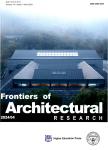Short-and long-term effects of architecture on the brain:Toward theoretical formalization
作者机构:Institute for Educational DevelopmentFundagao Getulio VargasFGVSao PauloBrazil Urban Plannins and Development Institute of the City of PilsenPUsenCzech Republic
出 版 物:《Frontiers of Architectural Research》 (建筑学研究前沿(英文版))
年 卷 期:2019年第8卷第4期
页 面:564-571页
核心收录:
学科分类:0303[法学-社会学] 1305[艺术学-设计学(可授艺术学、工学学位)] 0601[历史学-考古学] 0202[经济学-应用经济学] 081302[工学-建筑设计及其理论] 08[工学] 0813[工学-建筑学] 0814[工学-土木工程] 0833[工学-城乡规划学]
主 题:Brain Neuroarchitecture Neuroscience Behavior Short term Long term
摘 要:The physical environm ent affects people’s behavior and *** effects can be easily noticed through observation,whereas others require an in-depth study to be understood and *** many alterations can be positive,some can also negatively influence wellbeing,decision-m aking,and m ental and physical *** of these effects are not easily associated with physical ***,people may be unaware of the real triggers for changes in behavior,mood,and *** many studies have been performed on environmental psychology,detailed research to understand the im pacts of architecture on the brain using neuroscience is *** difficulties experienced by researchers in this field are on the isolation of each stimulus to understand its effects individually and m easurem ent of brain changes in people interacting with the environm ent because some brain scans,such as fMRI,require people to be inside the ***,the several ways a space can impact its users should be discussed to understand how architecture influences in dividuals and to help architects and urban planners in designing efficient and healthy *** study aims to describe and analyze the results of previous research works and propose a way of organizing them to facilitate further investigation on this field.



